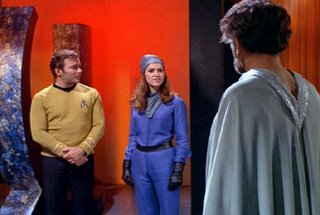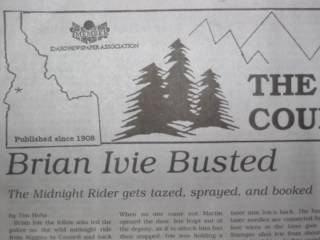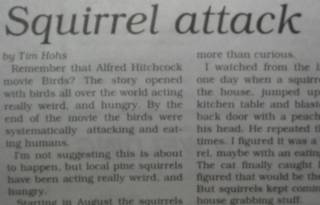
The U-Haul is packed, more or less, the DI truck has left, and in an hour or so, I'll be off on the next installment of the adventure. I'll be back in a week for cats, in two weeks for wife, son, and dogs. I'm leaving this place where I married, where my wife and son


were born, where my father-in-law, rest him, died in harness two hours after a pre-trial, and where somehow I came to rest and stayed put for the longest stretch of time since high school.
I first set foot in the old courthouse back in 1995, the day before my wedding. Months before, I'd applied for a job with the federal defenders, the first in a series of fool's errands to that august body.
 (typical state court p.d. (center) interviews with federal p.d. (right) to bemusement of man of action (left))
(typical state court p.d. (center) interviews with federal p.d. (right) to bemusement of man of action (left))They rejected me, and not for the last time, but sent my CV on to various Idaho chief p.d.'s who might have lower standards, including the chief in Twin, who invited me to interview. I'd found a job I liked in Washington State by then, as a prosecutor alas, but a civil prosecutor at least, but I figured, I'll be in town for a wedding, so what the heck, it'll be good juju for the future. What an odd day. I got the marriage license, met with the guy (who maybe didn't have the best people skills and surely would've fired my *ss within a year), ducked my ex-girlfriend the criminal defense lawyer in the parking lot, and drove around town buying mixed nuts and mints for the reception and listening to Kurdt Cobain yowling, "married...buried...yeah, yeah, yeah, yeah." The wedding was much more fun.
Somehow I must have intuited that I'd be back, and since April 1998, here I've been. My boy Joe arrived in 1999, in time to meet his grandfather. My practice became exceedingly interesting: I befriended a few murderers, I saw others recover, I made a few stands and won a few trials though I let down a few other defendants, but in general felt I could hold my head up when running into old clients at the grocery outlet. I'm proud that want ads under my by-line said "Class standing is less important than commitment and a sense of humor." I had some remarkable colleagues with smarts and heart at the Twin Falls County Public Defenders Office. You know who you are. If you don't know who you are, thank you Jon O., Paulie, Tony, Casey, Denise, Wells, Robert, Julia, Brett, Robin C., Bryan, Christa, Jack, L. Scott, Sandra, Charles, Teri, Ben, Susan, Robin W., Chris, Brody, and Marilyn. I leave an orphaned placeholder of a website to whoever can figure out how to update it. I haven't exactly finished my course, but I am taking it on the road now.
Consequently, this site will be going radio silent for a couple of weeks or so while I learn the ropes of my new posting. So it's farewell, Idaho, my old antagonist and friend, until we meet again.

















